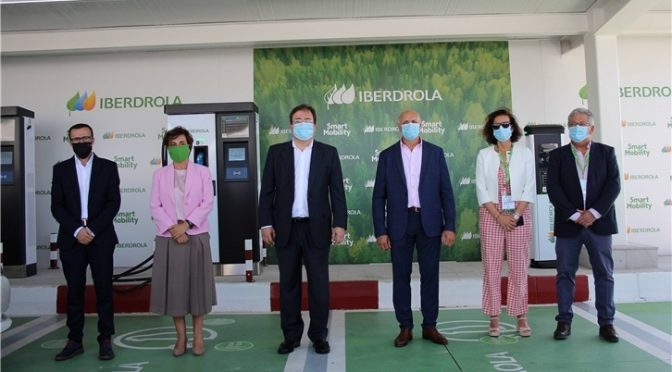Iberdrola has made progress with its electric mobility plan by opening a Premium Service Station with super-rapid and rapid charging points along one of the main corridors on the Peninsula that connects the centre and south, that is both western Andalusia and Portugal.
The president of the government of Extremadura, Guillermo Fernández-Vara, the CEO of Iberdrola España Ángeles Santamaría and the general manager of the Leo Complex went along to charge the first vehicle at the super-rapid charging point at this Premium Station. The station has a 150-kW charger and two rapid and standard chargers, with 50 kW and 22 kW respectively.
The Premium infrastructure breaks records when it comes to the time needed to charge an electric vehicle, which is just five to ten minutes. It also slashes the cost of driving, with the 538-km trip from Madrid to Seville (or vice-versa) costing just over €10 euros, and the journey from Madrid to the Cádiz coast (or vice-versa) just over 15 euros*. This is three times cheaper than travelling in a petrol-fuelled vehicle, which costs around 45 euros for the Madrid-Cádiz route. What’s more, it is a sustainable choice that does not emit CO2 into the atmosphere.
The main super-rapid charging corridors
The Premium Service Station in Monesterio with super-rapid charging facilities is on the Leo Complex, a facility visited by 4.7 million vehicles last year. Users have recognised it as one of the top five in Spain and the best on the La Plata (Silver) motorway.
In Extremadura, the company is applying for permission to build a further 18 charging stations on public roads – one of them a Premium station – and it is looking at seven more sites. Several of which will host super-rapid chargers.
Since March, Iberdrola has been on a mission to speed up its sustainable mobility plan, in which it will invest 150 million euros over the next five years. This initiative will ramp up the commissioning of these electric vehicle charging points – to a total of 150,000 in homes, companies and on the public road network – consisting of super-rapid and ultra-rapid chargers (150 kW and 350 kW respectively) on the country’s main motorways. These will be installed every 100 km and 200 km, respectively.
Three months on, and despite the extraordinary inconveniences of the Covid-19 situation, Iberdrola is opening a Premium Station on the Silver Route. A similar facility is set to open in Oropesa (Toledo) on the A5 or South East motorway, within the next few days. Work is already underway to build super-rapid charging infrastructure on two more of the country’s most important corridors: the North-West motorway or A6 between Madrid and Galicia and the North-East motorway or A2, which will enable electric vehicles to charge, at competitive prices, as far as Barcelona.
So far, Iberdrola has installed 5,500 electric charging points nationwide. Around 600 of these are rapid charging points on roads and motorways. The company has more than 1,800 rapid, super-rapid and ultra-rapid charging points on public roads in different stages of development.
Electric vehicle drivers using Iberdrola stations can charge their electric vehicles with 100 % green energy from clean generation sources with renewable Guarantee of Origin (GoO) certificates.
The Premium Station in Monesterio is now available on the Iberdrola Public Charging App, the only one in Spain with verified information about all Iberdrola’s Public Charging points, and those belonging to other operators. The digital app enables drivers to locate, check the operational status, and in the case of Iberdrola chargers, book a charging point and pay with a mobile phone.
Iberdrola speeds up electric mobility
Iberdrola is on a mission to electrify transport as part of its decarbonised economy strategy. This is a key factor for reducing emissions and pollution in cities and pivotal to the post-Covid-19 green recovery.
In March, the company decided to step up its sustainable mobility plan by making additional investments – a total of 150 million euros – to provide even more electric vehicle charging stations. The initiative entails around 150,000 electric vehicle charging points in homes, companies and on the public road network in cities as well as on the main motorways and highways over the next five years. The commitment to deploying fast charging stations will see the company install ultra-rapid (350 kW) charging stations every 200 kilometres, super-rapid (150 kW) every 100 kilometres, and rapid (50 kW) charging stations every 50 kilometres.


